‘I don’t know how he didn’t quit’: Through all the hardship, Ty Farmer is still standing
Challenges, cancer & championship-winners.
April 2, 2020
The excitement practically jumped through the camera.
A USHL reporter stood with Ty Farmer at center ice of the Covelli Centre after his Fargo Force defeated the Youngstown Phantoms for the 2018 Clark Cup. This reporter was tasked with asking the basic questions one asks the newly crowned champions after touching the league’s peak.
You know the questions – “what was going through your mind when…” and “what was it about this team…” and then the best, and simplest one: “how does this feel?”
Farmer could barely get the words out and he had to contain himself from exploding with joy as his team celebrated around him. The Clark Cup was even hoisted and kissed behind him as the interview was taking place. Though the arena had emptied out at that point, it was a small kind of bedlam.
“Unbelievable,” Farmer said of the moment.
It’s hard to blame Farmer for having trouble finding the right words to describe what had just taken place. Even his parents joked about it moments before it actually happened, hardly believing that anything of that magnitude could take place.
And it made sense why it was hard to believe when considering what Farmer had been through – the on-ice and off-ice hardships — what he was going through and what he had yet to face. There would be more instances of adversity coming.
But in that moment, nothing else mattered. Farmer just had the moment of his life and lifted himself to heights he hadn’t previously imagined. His smile spanned ear to ear and speechlessness was expected.
It made sense this Clark Cup victory felt like the center of the universe.
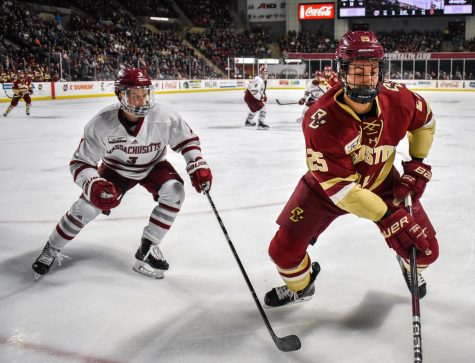
There was a time in which “hockey” and “St. Louis” were not synonymous with one another.
It was never barren of hockey by any means. The Blues were just about good enough to inspire a few kids to suit up for youth hockey. But the area was no northeast, Minnesota or Michigan. Scouts weren’t flocking to St. Louis thinking they’d discover the next Wayne Gretzky, although No. 99 did spend half of the 1995-96 campaign with the Blues.
So, when Rob and Kelley Farmer moved 15 minutes down I-70 from St. Charles, Missouri to O’Fallon with their new son Ty, hockey rinks were few and far between. However crazy that may seem now, it was far from their thoughts when they built the house when Ty was just a toddler.
Little did they know the most influential piece of real estate in their lives actually laid a mile away from their new house.
A roller hockey rink.
When Ty was about three years old, his father went over to the roller hockey facility to play a pick-up game with some friends. He came home after with a simple and direct message – one that would have a lasting impact on the family for years.
“Kelley,” he said. “We have to sign Ty up for roller hockey. It’s on a super small rink and they play in their tennis shoes and the parents can go out and walk around.”
That was enough of a pitch to get Ty out on the roller hockey rink. For the first year, his parents were out there helping him out, showing him where to go and acting as a safety net for the inevitable falls.
Soon after, Ty’s parents enlisted him in the actual roller hockey league and he picked it up like clockwork.
“It was huge,” Kelley said of roller hockey in O’Fallon. “We travelled. There were tryout teams, there were four or five different teams these kids could be on. It was huge here.”
Ty’s surprise roller hockey career coincided with the beginning of his actual on-ice career. His preschool ran three days a week and each day was a different activity – one day was art, one day swimming and then the final day was skating.
Right around this time, Ty’s parents wanted him to try out for an ice hockey team. They took him skating the night it was decided, saw he was a bit of a natural and he tried out the next day.
“It was just like ‘wow, how did he do that?’ when a lot of little kids can’t even stand up on [the ice] for months and everything,” Kelley said. “He took off. He was done.”
It’s no surprise Farmer was one of the better kids in his age group, and it stayed that way for almost the entirety of his youth hockey career. But in that age range at that time, a hockey tornado of talent began taking form in the St. Louis area. Farmer grew up alongside some other very notable names who helped put the city on the map as a hockey bastion.
Clayton Keller. Matthew Tkachuk. Brady Tkachuk. Logan Brown. Trent Frederic. What’s the only other thing all five of those guys have in common other than being from Missouri?
All were first-round picks.
Some of the most influential figures on Farmer’s hockey career came about during the youth years. Former NHL d-man Jeff Brown was one of Farmer’s most consistent coaches and Blues legend Keith Tkachuk stood behind Farmer on the bench as well. Keith’s son, Matthew, was a year older than Farmer and Brady a year younger, so Tkachuk only coached Farmer a limited amount. With Tkachuk playing on the Blues at the same time he was coaching his kids, Farmer was provided with opportunities most youth hockey players could only dream of.
For starters, he was being coached by a future Hall of Famer. Tkachuk also had some pretty good teammates on the Blues, such as David Backes. When Backes was a rookie and living with the Tkachuks, he played mini hockey against Farmer one day.
“It was 100 percent something I’ll remember for the rest of my life,” Farmer said.
As cool as it was playing for Tkachuk, Farmer’s main mentor was Brown. Since Logan and Farmer were the same age, they played on the same teams for most of their youth years. Brown was behind the bench for all of them.
“He was a huge influence on me,” Farmer said of Brown. “He knew the path to success, and I listened to everything that he ever said to me and I never took it for granted. He was always a great mentor growing up and coach so we’re obviously in different areas now. It’s a little different. But when I see him around, I still call him coach.”
“Jeff Brown was very disciplined, expected a lot out of these guys and didn’t take anything less,” Kelley said. “So, it was a great learning lesson for him. Jeff has instilled so many values and taught him the right thing to do – play smart hockey. That was huge for Ty.”
All of these things – standing out among elite talent and being led by elite coaches – guided Farmer down the path of juniors.
“Without those resources, I probably wouldn’t be here today,” Farmer said.
So, at the age of 16, with hope on his mind and his eyes toward the future, Farmer headed nine hours east to join the Youngstown Phantoms of the United States Hockey League.
This was just another step in the journey. Or so he thought.
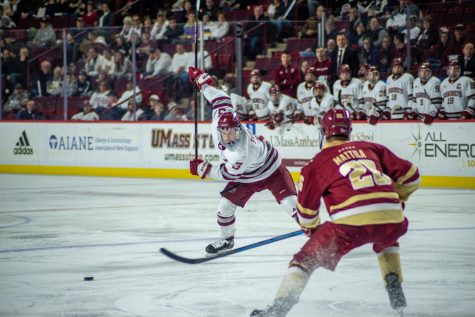
Youngstown, Ohio sits in the far-east corner of the state. Cleveland sits roughly 60 miles away while Columbus is about 172. It’s a city that, like most in the Rust Belt, used to be a hotbed of steel. It’s struggled to find its identity since.
It’s no NHL-caliber city by any means, but Youngstown does boast a USHL team.
When Farmer reported to town in the second half of 2014 as a 16-year-old, the sky seemed to be the limit. Here he was with the opportunity every teenage hockey player dreams of. The USHL is a feeder to top Division 1 programs around the country.
Farmer was young, and the team was much older, which meant less time on the ice and more time on the bench. Kyle Connor was the headlining name on that team. The Phantoms were the best team in the league that season and Farmer was just a rookie. Ice time wasn’t easy to come by.
Mentally, it was very tough on the first-year.
“Growing up, every guy that plays juniors at the USHL level is one of the stars on their youth team,” Farmer said. “I got thrown into a league as a younger kid and everyone was a star. You get there, and you might have to take a different role on the team.”
Farmer’s role was far from big his first year. The concern really started to take hold when that role didn’t increase much in his second year and then really escalated in his third season.
Things were not trending upward like he thought they would.
“My husband and I are realists,” Kelley said. “We get it. He was younger than everybody. We knew there was going to be a time frame where he may not play. But when it continued to be a couple years, that’s when we kind of started getting concerned.”
His point totals over the three seasons in Youngstown went as follows: five, three, seven. His second season in Youngstown saw him miss a lot of games due to injury. Things weren’t getting much better in his third.
Roughly 20 games into the 2016-17 season, his third in Youngstown, Farmer needed a change of scenery and requested a trade.
“It was hard because I’m always close with all my teammates like any team I’m on, they’re considered brothers to me,” Farmer said. “It was definitely hard.”
Around this same time, Farmer committed to Michigan State. But due to a coaching change, the commitment fell through and Farmer was back on the market.
His career was spiraling downwards and there wasn’t much reason for optimism. All signs pointed toward the youth hockey star being chewed up and spit out by the USHL. Things only got worse.
“Honestly, I don’t even know how he didn’t quit,” his mother said. “To go from top player here in [St. Louis] to on the bench for two and a half years and playing very minimal, it’s hard for anybody. Even an adult.”
Farmer eventually got his wish. The Muskegon Lumberjacks were making a late playoff push and wanted to add a mobile defenseman. Farmer fit that bill and midway through the season, he was headed north to Muskegon, Michigan.
His role was a bit expanded with the Lumberjacks and he finished the regular season with three goals and nine points in 24 games.
There were two extremely important things Farmer acquired in Muskegon. For one, it was a fresh start; the beginning of his new beginning so to speak. The second was a relationship with a 5-foot-10 offensive defenseman out of New Jersey. He was the top d-man for the Lumberjacks at the time.
Marc Del Gaizo.
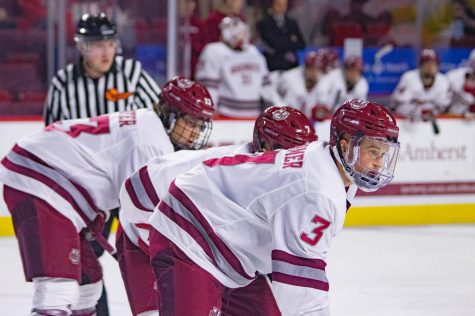
Cary Eades already knew Ty Farmer fairly well.
Farmer played for the US National Team when he was 16 years old, competing in the Five Nations tournament in Germany. Eades was the coach.
Fast forward a few years to the end of the 2016-17 USHL campaign, Farmer was a new member of the Lumberjacks and things looked to finally be headed in the right direction. But things were about to get a lot better.
Eades was the then-coach of the Force. He viewed Farmer as a project with lots of upside and wanted him. That led Eades to pull the trigger on a trade right before the 2017-18 season and bring Farmer from Muskegon out to eastern North Dakota.
“We were confident we could get him back on track,” Eades said.
Fargo sits on the Minnesota border, which makes it less rural than the rest of North Dakota. The city’s population is roughly 105,000 – the largest city in the state.
That’s where Farmer would rebuild a career that took almost 17 years to make.
Of all places. North Dakota.
“This is a new chapter, a new start,” was Eades’ message to Farmer when he first arrived. “What had gone wrong before, you can’t dwell on. Here’s our expectations of you, starting with the focus and work ethic in practice.”
There were lots of steps the coaching staff took to work with Farmer on little things in his game. Pierre-Paul Lamoureux, the defensive coach, took to simplifying his game. An emphasis was made on moving the puck quicker and jumping up with the rush.
In his own zone, it was about efficiently retrieving pucks from the opponent’s forecheck and protecting himself.
“He was kind of a high-risk, high-reward player as a youngster,” Eades said. “I think that’s what soured him on his previous two stops in the USHL. As he started to mature and understand the situations of a game, when to go, when not to go, when to use the glass, so on and so forth, his game matured, and his mistakes started to be minimal.”
The other main focus: turning Farmer into a top-tier two-way defender.
“My first time really thinking about being a two-way defenseman was with Cary Eades,” Farmer said. “He just sat down and explained to me that this is the role. This is what’s going to make me successful. This is what’s going to take me to the next level. So, I had to let that sit in my mind for a second and change my ways.”
It paid off. Farmer finished sixth on the team, and first among defensemen, with 39 points. His numbers were all career-highs by far. He even finished out the season making the All-USHL Second Team. Things were trending upward.
“I thought he became one of the best two-way defensemen in the league his last year,” Eades said.
Around this same time, Farmer received a call from an unknown number. When he picked up, it was Jared DeMichiel – an assistant coach for UMass. DeMichiel watched him a few times and UMass gave him an offer over the phone. Because this was all taking place during the holiday season — November and December of 2017 — Farmer never even had a chance to visit campus.
What helped make up for never going on an official visit was his relationship with Del Gaizo, now one of his roommates in Amherst. He also met Del Gaizo’s brother, Anthony, and Bobby Kaiser during his time in Muskegon. All three were committed to UMass at the time.
“When I got that call from [DeMichiel], the first guys I think of are them,” Farmer said. “I give them a call and I go ‘what do you think about this?’ It was a no-brainer. I didn’t even visit, and I was content with it. I wanted to come here.”
So, Farmer finally committed to play Division I college hockey and he’d become a top defenseman in the USHL.
To cap it all off, the Force blazed through the USHL playoffs, reaching the Clark Cup.
The opponent: the Youngstown Phantoms.
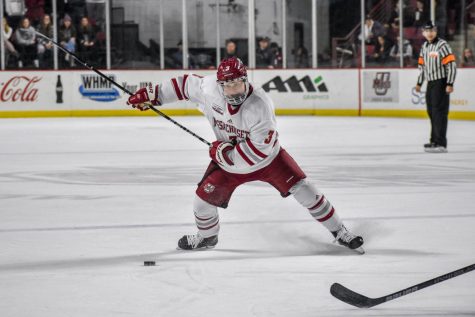
As the road to the Clark Cup became shorter and shorter for the Force and the success was ample on the ice, Farmer’s adversity off the ice heightened dramatically.
In the midst of the playoff run, some rough news came his way from back home: his mother, Kelley, was diagnosed with breast cancer.
It would be her third bout some form of the disease. When she was 14, she had bone cancer that led her to having a prosthetic leg. She was diagnosed with thyroid cancer in her late 20s. Now this.
“She’s a fighter,” Farmer said.
So, Kelley was to fight breast cancer while Farmer was to not only compete for a Clark Cup, but also ready himself to go off to UMass just a couple months later.
“Definitely a bunch of weird transitions going on,” Farmer said. “I’m going to college, new city, new town. All this stuff is going on at home and I can’t go to doctor’s visits. Just try to keep in touch as much as I can.”
But with Kelley’s motherly instincts, she was actually happy her son was off pursuing his dream elsewhere rather than constantly being around and worrying about her.
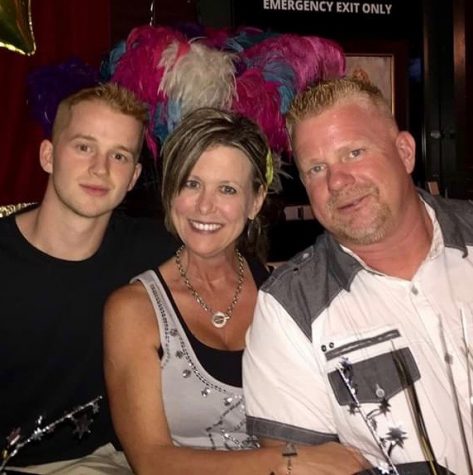
Ty, Kelley and Rob Farmer.
“I would rather have him there and not focused on what’s going on here and not worrying,” Kelley said. “It’s almost like I didn’t want him to fall back to the Youngstown time where he was focused on hockey, but he wasn’t playing hockey. I didn’t want him to start worrying and not be in a position.
“He needed to make hockey his priority and it was perfect he was there.”
It was still his mother. Despite chasing the dream and being in the midst of his best season in the USHL, it was hard to not think about his mom, an 11-hour car ride away, battling a disease that could’ve taken her life.
“It’s always in the back of your head,” Farmer said. “You’re not with her. But you never really know when it can happen.”
Both had separate jobs to do during that time. For Kelley, it was fighting the disease. For Farmer, it was to focus on his hockey career.
Cary Eades had a large role in that.
“He shared some things with us,” Eades said. “That’s something that you deal with at all levels of coaching. Personal issues that can affect a player’s game. Ty was able to separate that. He came to the rink and kept his focus and then took care of his business away from the rink. That’s something that is easier said than done and he did a really good job of it.”
In September of 2019, Kelley won her fight, and she was deemed cancer free. Farmer tattooed the Book of Revelation on his shoulder in honor of her.
“She’s very tough,” Farmer said of his mother. “Honestly, that’s why I play.”
It was not the only meaningful event in this time frame Farmer would get a tattoo to honor.
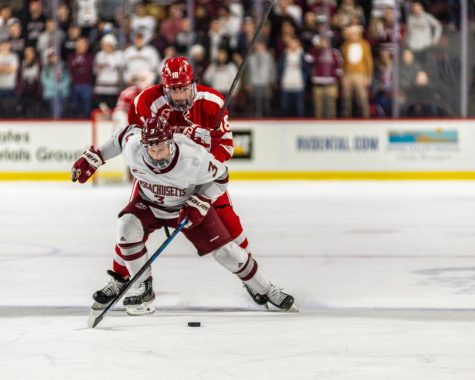
Kelley and Rob Farmer turned to each other at the beginning of the third period and cracked a joke.
“Wouldn’t it be great if Ty scored the last goal against the team that didn’t think he could play that made him sit for two and a half years?” Kelley recalls saying to her husband. Farmer’s parents weren’t at the game. Instead, they threw a big party back home in O’Fallon, Missouri to watch the championship.
They could only dream of such a joke becoming actual reality. Or so they thought.
With three minutes remaining in a tied Clark Cup, Ty Farmer went to make a D-to-D pass with his partner in the neutral zone. With the Phantoms sagging in their coverage, Farmer took the space they gave him. That’s when a hole opened up and there was a clear path to a breakaway.
Farmer took it.
???FARMER!!!!!!!! FORCE LEAD 3-2 WITH 3 MINUTES LEFT IN REGULATION!!!! pic.twitter.com/XsQoH7ErsN
— Fargo Force (@FargoForce) May 20, 2018
In the blink of an eye, Farmer burned the two defensemen and survived both of their attempts at freeing up the puck. With a second of separation, he hoisted the puck over the Youngstown goalie’s glove and with that, put the Force up 3-2 in the biggest game of his life.
“He’s not afraid,” Eades said of the goal. “He’s not afraid to make a big play…We were kind of like ‘oh no, no’ to ‘oh yeah, yeah!’. That’s what he brings to a team is clutch plays under pressure.”
This wasn’t just a clutch play under pressure – it was the most clutch play under the most pressure-filled circumstance.
There was also added meaning to it because of the logo on the other side of the ice.
“It was the perfect way to say ‘you know what? I made it.’ It was a good learning lesson, right?” Kelley said. “He worked hard, and he kept his eye on the prize and he did it.”
The goal was the eventual game-winner, as the Force went on to add an empty-netter and win 4-2. It was Fargo’s first ever Clark Cup championship.
The victory’s impact was huge on the then-teenager. Scoring the game-winning goal in the championship game of any league is the dream for any hockey player. But to do it against a group who didn’t believe in Farmer quite like he and the Force had was on another level.
“At the time, it’s not the national championship, but it’s the championship,” Farmer said. “It was pretty cool to be a part of that run with that team. Probably the best group of guys other than what I’m around now. I love those guys.”
That feeling lasted and eventually, Famer and some of his teammates got tattoos that said “CCC*XVIII”: “Clark Cup Champions” and “18,” the year in which they won it. Farmer’s father Rob even recently got the tattoo to commemorate the win.
For all Farmer went through, and still had yet to go through, it’s clear why that Clark Cup championship felt just like the center of the universe.
With one bit of adversity down, Farmer basked in its glory. There was still more off the ice. But once that became complete, Farmer would choose to wear symbols of it on his shoulder for the rest of his life.
The two reminders of why he’s where he is today.
He’s still standing.
Evan Marinofsky can be reached at [email protected] and on Twitter @emarinofsky.
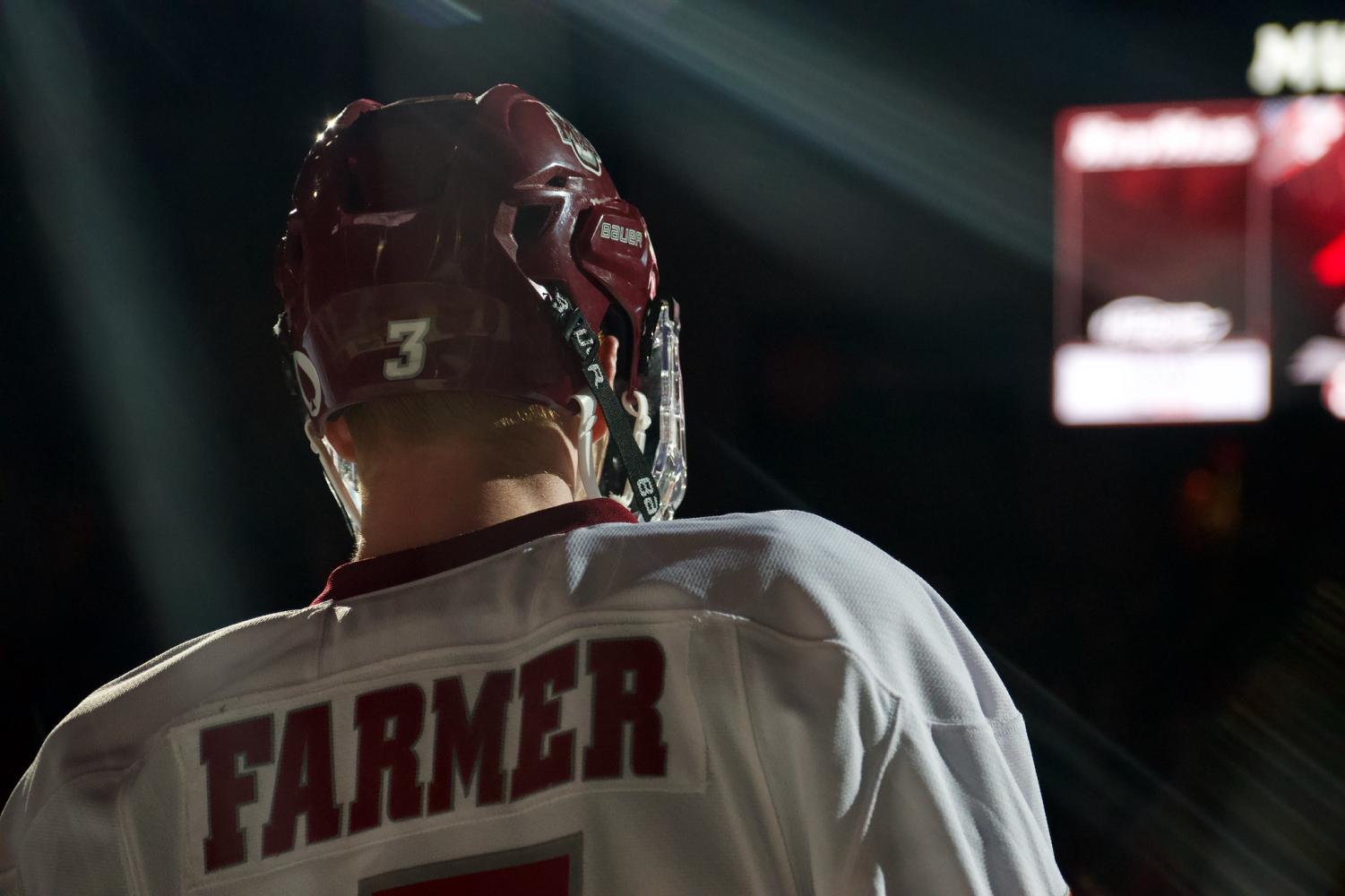
Rob Farmer • Apr 2, 2020 at 2:54 pm
Just wanted to say
Thank you